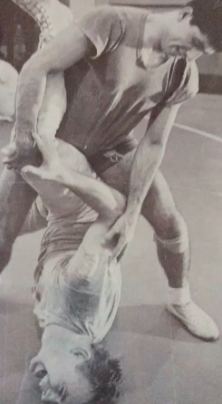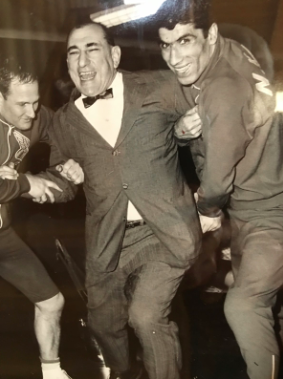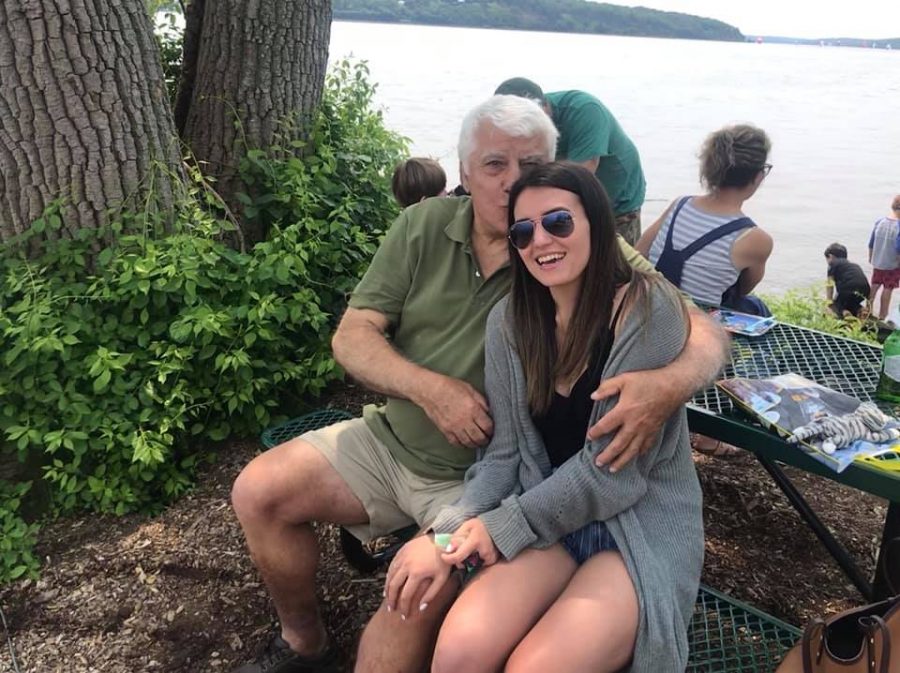The Fight For Freedom
Hassan Makhmaltchi was one of the one hundred Iranians that were allowed to leave Iran in the 1960s. Hassan did this with the help of America and his favorite sport, wrestling.
When Hassan was younger and living in Iran he remembers it as Persia, because that’s what Iran’s original name was. In the 10th century, Muslims took over Persia and it became Parse but quickly after that in 1977, a new ruler took over. “That maniac took over my country,” Hassan said while talking with me. His name was Ilatoa and this is when many other Iranians were deciding to flee the country. Luckily, Hassan mentioned that he had been out of Iran by the time he took over but a bunch of family members were not and he was truly worried for them.

Hassan picked up wrestling at the age of fifteen, while he was in his third year of high school. Wrestling was and still is Iran’s national sport but soccer is also a big favorite as well, Hassan mentioned to me. His weight class was the `191 weight class and this was high for a third-year high school student. “I was one of the tallest people in my grade, and even in my school,” he said. Hassan mentioned that he is now six foot two and his two children, one girl and one boy, and two grandchildren are even tall themselves. In 1958 at the age of 18, Hassan won the state championship for his weight class of 191. People respected him and loved him, and this got him a lot of attention. This not only caught the attention of the regular civilians but it caught the eye of the government and the Olympics team.
Two years later, the Olympics was held in Rome. The Olympics were a super important time in Hassan’s life, not only because it was the Olympics but because he had the chance to get out of Iran if he could prove himself to the other teams, America especially. Hassan was the alternative wrestler for Iran, the main star though was Emam-Ali Habibi. Habibi was the five-time champion from Iran. In 1960 though Habibi was defeated by Doug Blubaugh who won the gold medal in freestyle welterweight. Hassan mentioned that Blubaugh and he had talked and he told him that he was a great wrestler even though he didn’t get to the main match. Blubaugh wanted to help Hassan get to America because they believed that they should have him on their side. Hassan also mentioned that he felt differently about the Olympics now after I asked him. “Everyone seems to cheat now and it seems unfair with all the drugs and supplements people can take,” Hassan said. He did say though that it was an experience of a lifetime and it will be something that he will remember for the rest of his life because it is the reason why he got out of Iran.

Doug Blubaugh was apart of the New York Athletic Club which is in New York City and he had mentioned Hassan’s name to them and how he insisted that they needed to help him. Hassan at this point already knew multiple Americans from the Olympics and he enjoyed their company greatly, he truly believed he belonged in America and not stuck in the Middle East. The New York Athletic Club wrote a letter to the American counsel to help Hassan get a visa to come to America. In the letter, they mentioned he was fit to wrestle with them, that he would have a place to stay when he got here, and that they would help him find a job. Hassan mentioned that he was happy he came in the right way instead of trying to sneak over without papers because he doesn’t know what would’ve happened to him if he didn’t come over legally. When word spread in Iran that he planned on leaving the government was upset that he was trying to leave, and even though Hassan tried to keep it quiet that he was going to be leaving they still found out. The offered him money, offered him to wrestle in another Olympics and he declined.
Later that year in 1960, he came over on the boat. He passed all inspections, was healthy, had the right paperwork, and even had a letter encouraging his arrival which made it even easier for him to get here. “I was nervous when I first came to America, I had a lot of expectations to live up too and I didn’t want to disappoint anyone. The New York Athletic Club is the reason I am here and so are my children and grandchildren, I wouldn’t have it any different,” he stated to me. There was a lot of pressure on Hassan not only just in America but in Iran too. Iran wanted to watch him fail in America but he didn’t let that happen.
When he arrived, he came with only forty dollars in his pocket and he shared a small apartment with his older brother. He had multiple jobs to help him make sure he could live a suitable lifestyle. “The hardest part was the language barrier, I was trying to meet new people and talk to others but I only knew how to speak Persian. The only person that I could really talk to was my brother,” Hassan said. Hassan’s jobs ranged from being a bouncer at a restaurant named, Nine Circles. Not only was he a bouncer but he was also a watchman for a army camp in Long Island, New York. “I enjoyed my jobs and they helped me make money so I could survive and I was glad the people gave me a chance to do it even though I knew very little English,” he stated. He began to tell me that he started learning English from the television and just listening to others around him, he eventually picked up on it.
Another big factor in his life came in 1964, his wife Vivian Makhmaltchi. Vivian helped Hassan learn English because he hung out with her family and friends who were from America. “I helped him earn his citizenship too,” she stated while weighing into our conversation. Vivian was a big help because not only was she an American but she was a writer, she worked for a publishing company in the city. She helped Hassan speak and write English as well as helped him with grammar and also helped him with numbers. Four years after they got married, in 1968 Hassan finally earned his citizenship which was big for him. This only helped him more with his confidence and it helped him work harder to achieve goals he thought he could never achieve before. He never thought once a day in his life that he would be a citizen and it was all with the help from Vivian, her friends, and her family.
Hassan gave back to the community as he worked in the department of corrections. He worked in Sing Sing which is a maximum security prison in Ossining, which is the neighbor of Tarrytown. In Sing Sing, Hassan served as a counselor for inmates who had four years until they saw the parole board. Hassan helped prisoners change their lives around by helping them get ready for a job and to reenter the real world again. “None of the prisoners I worked with ever came back. I think one, they truly did want to have a new start to their lives and two, that they were scared of me and knew I’d be angry with them if they ended back in prison,” Hassan stated. He decided on this job because he wanted to help others like how others helped him.
During all of these jobs, his free time was spent wrestling at the New York Athletic Club on Central Park South, at multiple different YMCA’s around the city, and on the New York University campus on 15th street in New York City. He was one of the biggest and scariest guys in the room when he wrestled, people were terrified to wrestle with him because they knew he was the real deal, especially since he came from and trained in Iran. Hassan racked up multiple awards from championships all over New York City. He won the Senior Metropolitan Championship for nine years straight, the New England 1965 Championship, and he got an award for Outstanding wrestler at a YMCA in Manhattan. “I felt like I needed to win all the time for the New York Athletic Club because they helped me get to America. They made a small kid from Iran into one of the greatest wrestlers they had,” Hassan stated. He continued on, “People were scared of me, no one wanted to wrestle me. My true friends knew though that I was one of the nicest people in the room even though I seem intimidating.” Hassan brought two photos to show me which will be shown at the end, one of him holding a guy upside down and another with one of his best buddies who was the one who helped him get to America, Doug Blubaugh.
Hassan didn’t only have the pressure from America but he had the pressure of the way people looked at Iranian’s. Hassan was mostly worried for his two children who were born in 1969 and 1971. Eight years after they were born, Iranian’s took over the American Embassy in Tehran from November of 1979 to January 1981. That’s 444 days that 52 American hostages were held by Iranians. The American hostages were made up of government officials and citizens. This put a restraint on his children’s lives because most of their friends knew they were Iranian and that their father was from Iran. This caused them to be teased, bullied, and called terrorists even at such a young age. During this time, the FBI reached out to Hassan since he was trusted because he worked in the department of corrections. Hassan was asked to translate what the Iranians wanted in order to get the hostages back, and he couldn’t say no. After this time, Hassan cut off all ties with his Iranian family and friends because he didn’t want to be associated with them.
In 2001, Hassan took a big step. One of the most historic events in America’s history happened on September 11th, 2001. The twin towers were knocked down by terrorists, now even though the terrorists weren’t Iranian, people would get Muslims and Iranian people confused. Everyone in the Middle East was compared to one another regardless of the race, all Americans thought of them as terrorists, Hassan told me. After 9/11 happened he officially changed his name from Hassan Makhmaltchi to Sam Makhmaltchi. “I changed my name because I hated my name and it had a part of my life I wanted to forget, I also changed it to not be a high-risk at the airport because I knew it would cause major problems,” Hassan stated.
As stated previously, Sam came to America with forty dollars in his pocket and has changed that forty dollars to five million dollars to this day, give or take. He owns an apartment on the west end of New York City and a weekend house in the Catskills, which has a waterfall in the backyard. “I am very proud to be an American,” Sam told me. “My life would be different if I never came over, I look at the news and see what’s happening in my old country and it breaks my heart but it’s not apart of me anymore,” He said to end the interview.
Hassan who is now seventy-nine years old is a champion of multiple wrestling matches and a true American. He gave back to the community when he first came and still does till this day. He is a member of his apartment building board and an inspector for multiple hotels around the world. Hassan is still a member of the New York Athletic Club which is now in the city and in Pelham, New York. He visits the club every so often, usually during holidays like Christmas and Easter. He also attends events when his friends are winning awards for the past or even the present. Hassan’s legacy lives on in the New York Athletic Club as multiple people still know who he is and one of his wrestling pictures hang up above a table in the Tap Room.

Alexis Lynch is currently a senior at Mercy College. At Mercy, Alexis is a Media Studies major with a focus in Journalism. She has gained experience that...








